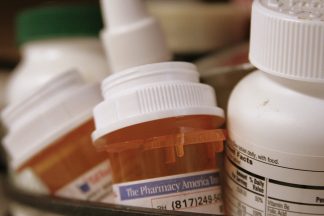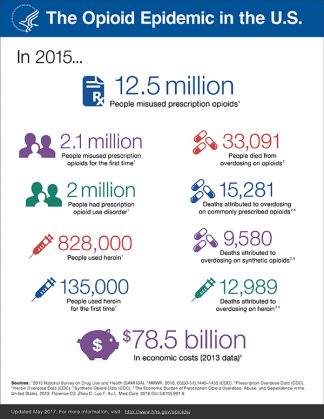by Amy Claussen
The President’s Commission on Combating Drug Addiction and the Opioid Crisis asked the President on July 31 to declare the opioid crisis a national emergency.
The commission recommended increased treatment capacity, implementation of prescriber education mandates, and expansion of Medication-Assisted Treatment (MAT) programs that use behavioral therapy and medications to treat drug abuse disorders. You can read the report and its full recommendations for curbing the opioid overdoses, which result in about 142 deaths each day in the United States.
President Trump addressed the opioid crisis in an August 8 briefing, but stopped short of declaring a national emergency. Such a declaration would reduce barriers and free up resources to address the crisis, which Health and Human Services Secretary Tom Price said can be done without an emergency declaration.
At the briefing, President Trump did not present a plan to implement the recommendations made by his commission, but did vow to increase federal drug prosecutions as a means of stifling the opioid crisis. Two days later, President Trump declared the opioid crisis a national emergency stating, “The opioid crisis is an emergency, and I’m saying officially right now it is an emergency.” No implementation policies were provided at the time of the announcement.
This post is intended to provide information on recent news, current research, and reliable information to help you understand the the opioid crisis — including information about what the University of Minnesota is doing to help.
About the opioid crisis
Center for Disease Control and Prevention figures from 2015 showed that that 12.5 million people misused prescription opioids and over half of the 33,000 opioid deaths were from prescription opioids like oxycodone, hydrocodone, and methadone. Opioid abuse was estimated to have an economic cost of $78.5 billion in 2013.
Chronology of events
Below is a timeline of recent events leading to the declaration of the opioid crisis as a national emergency.
- January 2016: Increases in Drug and Opioid-Involved Overdose Deaths — United States, 2010–2015 is published in the MMWR Morbidity & Mortality Weekly Report. This report shows a 200 percent increase in the rate of overdose deaths from opioids including opioid pain relievers and heroin.
- March 2016: The CDC issues its Guideline for Prescribing Opioids for Chronic Pain – United States, 2016, with recommendations for when to prescribe opioids for chronic pain in a primary care setting. The CDC also provides a checklist to help doctors who prescribe opioids for chronic pain.
- March 29, 2017: President Trump established the President’s Commission on Combating Drug Addiction and the Opioid Crisis.
- July 13, 2017: A press announcement by the Food and Drug Administration (FDA) commissioner established a Opioid Policy Steering Committee in conjunction with a report by the National Academies of Sciences, Engineering, and Medicine on pain management and prescription opioid use. Read more about the Timeline of Selected FDA Activities & Significant Events Addressing Opioid Misuse & Abuse.
- August 2, 2017: Attorney General Jeff Sessions announced the creation of the Opioid Fraud and Abuse Detection Unit. The Department of Justice pilot program will focus on opioid-related health-care fraud and investigate and prosecute health care providers and pharmacies who contribute to the epidemic of opioid-related deaths.
Freely available resources on opioids and the opioid crisis
The University of Minnesota’s Bio-Medical Library is the only Outreach Library in Minnesota, as designated by the National Institutes of Health National Library of Medicine/National Network of Libraries of Medicine (NLM/NNLM). Below, outreach librarian Katherine Chew lists some free NIH and NLM resources on opioids and the opioid crisis.
- Opioid Abuse and Addiction (MedlinePlus)
- Opioid Overdose Prevention Toolkit (Substance Abuse and Mental Health Services Administration)
- Opioid Crisis (National Institute on Drug Abuse)
- Opiate and Opioid Withdrawal (MedlinePlus Medical Encyclopedia)
- Understanding the Opioid Overdose Epidemic (MedlinePlus Magazine, Fall 2016)
- Opiate Addiction and Treatment (NLM Specialize Information Services)
Library resources on opioids
The University of Minnesota Libraries has many clinical health information resources that provide expert-level knowledge on opioid addiction. A few recommended starting places are listed, below. The Health Sciences Libraries Subject Librarians can be consulted for additional in-depth or specialized research.
- Opioid Use Disorder and Rehabilitation (STAT!Ref)
- Opioid Addiction (STAT!Ref)
- Opioid Toxicity and Withdrawal (STAT!Ref)
University of Minnesota research and expertise
Opioid addiction is also being addressed across the University of Minnesota with representation from the schools and colleges that make up the University’s Academic Health Center (AHC).
Recent news from the AHC has included a letter to the editor by U of M Vice President for Health Sciences, Brooks Jackson, M.D. and a New York Times piece on Breaking the Opioid Habit in Dentist’s Office featuring the work of Dr. Harold Tu, Director of the Division of Oral and Maxillofacial Surgery at the U of M School of Dentistry.
Many U of M researchers are working to end addiction. Several faculty involved in addiction research are featured as part of the U of M Driven to Discover campaign. Additional U of M expertise can be found by searching Experts@Minnesota.
Speak to your health provider if you need help addressing a drug addiction. Boynton Health clinics are open to U of M faculty, staff, and students.
Disclaimer
Never disregard your health care providers advice or treatment because of something found online. Information provided here is not intended to be used as medical advice, diagnosis or treatment. All content is for general information purposes only. You should review all information from these and other sources with your healthcare provider.







Thank you for bringing awareness to this ever expanding drug epidemic. It’s truly out of control.